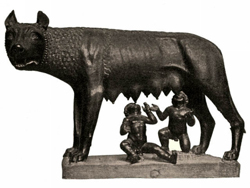Tag Archives: Latin language
Latin can be fun! Posted by leire on May 21, 2012
Today we will list some online resources where you can find funny uses of Latin language. (Click on the titles to see the web sites). 1. Fun Latin In this site you will find funny Latin sentences (and their translation to English) to use in any daily situation. It is very useful if you did…
Relative, interrogative-indefinite & other pronouns Posted by leire on Apr 26, 2012
Relative pronouns Singular Plural Masculine Feminine Neuter Masculine Feminine Neuter Nominative qui quae quod qui quae quae Accusative quem quam quod quos quas quae Genitive cuius quorum quarum quorum Dative cui quibus Ablative quo qua quo quibus The relative pronoun’s only function is the phoric, as it always refers to the antecedent, with which…
Phoric & emphatic pronouns Posted by leire on Apr 23, 2012
Phoric pronouns Singular Plural Masculine Feminine Neuter Masculine Feminine Neuter Nominative is ea id ei (ii) eae ea Accusative eum eam id eos eas ea Genitive eius eorum earum eorum Dative ei eis (iis) Ablative eo ea eo eis (iis) As the name suggests, its main function is the phoric: it is used…
Possessive & demonstrative pronouns Posted by leire on Apr 12, 2012
Possessive pronouns One holder Several holders 1st person meus, -a, -um noster, nostra, nostrum 2nd person tuus, -a, -um uester, uestra, uestrum 3rd person (reflexive) suus, -a, -um Its main function is the morphemic: they express the category of person and number. The reflexive possessive suus, -a, -um has also a phoric function…
Pronominal morphology & Personal pronouns Posted by leire on Apr 9, 2012
What are pronouns? Traditionally pronouns are defined as words that are used in place of the name. However, this definition is unsatisfactory, in a phrases like: I will go to the movies tomorrow What name replaces “I“? It is obvious that it does no replace any name. ‘I‘ is a first-person morpheme that indicates the…
Latin pronunciation Posted by leire on Apr 4, 2012
There is not “one correct way” of pronuncing Latin, it depends on which kind of Latin you are trying to speak. Classical Latin Classical Latin alphabet had these (capital) letters: A, B, C, D, E, F, G, H, I, K, L, M, N, O, P, Q, R, S, T, V, X, Y, Z C…
Latin literature III: Epic Posted by leire on Mar 13, 2012
Epic The epic was born in Greece at a time that is lost in the mists of time. The world it evokes and recalls the Iliad and the Odyssey is the Mycenaean world, but the poems, as have reached us, were written many centuries later, about 8th century BC. They are the first literary works…




